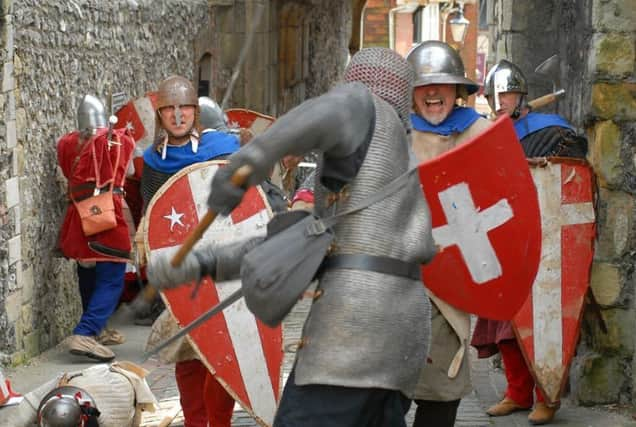Plan for Lewes battle re-enactment to become biennial festival


Organisers of Battle Royal 755 are considering following the lead set in Worcestershire, where a Battle of Evesham festival is held every two years.
Commemorating the 755th anniversary of Lewes battle in 1264, taking place on May 11 and 12, is the initiative of John Gower, an active member of Southover Bonfire Society.
Advertisement
Hide AdAdvertisement
Hide AdIt will see the streets filled with hundreds of medieval history enthusiasts replicating the momentous day when the armies of rebel baron Simon de Montfort and those of King Henry III and his son Prince Edward clashed.
Mr Gower said Evesham was very much jumping on the King versus De Montfort theme.
“I don’t blame them,” he said. “They now have a Battle of Evesham festival every two years. Trouble is that at the Battle of Evesham in 1265, Prince Edward won and was happy to see hapless Parliamentary pioneer Simon de Montfort hacked to pieces.”
He continued: “Everything is happening at a pace but we do have a core of around 100 participants already in place to make it work.
Advertisement
Hide AdAdvertisement
Hide Ad“These include medieval costume and combat expert Francis Burrows and heraldry researcher Jon Gunson. We see it as really exciting and it will grow as a brilliant event for Lewes every two years.”
Sunday, May 12, will be the big day to mark the battle which began on the slopes of Landport Bottom.
Fighting will continue on the streets and twittens as the rebls pursue the retreating royal army.
En route the forces will pause at several spots where known events occurred during the battle. These include outside The Black Horse inn in Western Road which is adjacent to the site of Snelling Mill where some of King’ Henry’s panicked commanders took refuge and were forced to surrender – including his brother Richard, King of the Romans.